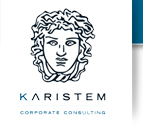
News
Press release
Karistem and Paradoxes study
The efficiency of the training function is still lacking in major companies
Paris, June 16, 2014. Only 57% of major companies are “very” or “somewhat satisfied” with the efficiency of their training services, making this a key issue for 85% of them. But yet, very few large groups have implemented actions plans in this direction. These are the main findings of a series of interviews conducted by consulting firms Karistem and Paradoxes, between March and May 2014, with HR and training managers of 21 major French companies. “If we knew that in the current economic environment, companies want to maximize the efficiency of their training and to operate at the lowest cost, our study shows that the different recognized levers to improve this efficiency are used in widely varying degrees across companies,” says Hervé Borensztejn, director of the Karistem HR Division, a consulting firm in strategy, transformation and operational excellence, and Philippe Joffre, founding president of Paradoxes, a consulting firm specialized in supporting and professionalizing players in training and skills development.
Continuing face-to-face training despite digital advances
While 93% of respondents reported currently working on optimizing and modernizing their training offer to improve efficiency, it appears that 85% of them still offer almost all courses in a face-to-face format . “There is a gap between rhetoric and practice, says Philippe Joffre (Paradoxes). The discourse is strongly oriented towards digital (e-learning, web-conferences, video casts…) but these innovative devices are, on average, 5% of training hours.” E-learning remains the most widely used digital tool (70%). “However, it suffers from a poor image due to the fact that it is often reserved for unattractive subjects, there is insufficient teaching offered for the modules and the ergonomic quality is very low. Moreover, it is more often “rapid learning” rather than e-learning itself,” continues Philippe Joffre.
Optimizing training purchases is another lever used by more mature companies to improve the efficiency of training. “The goal here is not to reduce costs in order to reduce costs, but to secure the process of competition, to survey and source methods, procedures and training actors, define the right need to set up a SLA (Service Level Agreement) and results engagements,” says Hervé Borensztejn (Karistem). If only 28% of respondents training departments work “systematically” with training services, 50% work collaboratively “according to certain criteria.” “Overall, the collaboration between training and training services is increasing,” says Hervé Borensztejn although, as Philippe Joffre stated “the functional relationship between training services and supplies management remains largely optimizable, more than 50% of participants felt that the respective objectives of the two directions are not aligned, making value-added cooperation difficult. “ Another good practice in terms of process: 82% of respondents systematically carry out tenders when buying training.
A very diverse knowledge of financing methods
Another lever used to improve the efficiency of training: integrating a true engineering of funding in all training projects. A topic even more relevant now that a new vocational training reform, with funding impacts, is underway. “Companies are waiting for the moment the regulations are applied and a priori do not plan to change their practices in depth, notes Philippe Joffre (Paradoxes). This reform is still an opportunity to think differently about training, and a way out of a number of anachronisms and cumbersome practices.”
Engineering of funding practices have largely been developed since the 2014 law, the majority of surveyed firms reported actively using “Contracts and periods of professionalization.” Similarly, 70% of them regularly meet their OPCA. Thus, the engineering of funding is increasingly complex (job training rather than a single logical qualification for example), co-financing develops (with local authorities in particular) and it is important that the players adapt or companies develop their skills accordingly, as Philippe Joffre.
Little visibility on the organization and performance of the training department
Finally, the study by Karistem and Paradoxes recalls that the transformation of the organization of the training department can significantly improve the efficiency of the back office. “The pattern of target organization depends on the model of governance of each company, but some drivers can be applied generally such as the establishment of a qualification at the request of interfaces with the business, or the pooling of dedicated educational resources or dedicated transactional tasks,” advises Hervé Borensztejn (Karistem).
That said, many businesses are not currently able to develop their back office, lack of visibility into their organization or their performance. Indeed, only 42% of respondents know how to differentiate their back office of their front office, 33% say they know the full cost of their back office, and 23% have KPIs or indicators on the quality of their service. “This lack of visibility does not always achieve the benchmarks, or assesses the potential gains achievable by optimizing the organization, says Hervé Borensztejn. It is however necessary when it comes to convincing the board to change the organization. “
A new dimension for the training function
The conclusions of the Karistem and Paradoxes study were nevertheless resolutely optimistic. “The training function, stakeholder in the make or buy decisions on the HR component, is taking a new dimension in business overflowing particular administrative framework and its traditional teaching practices to invest in new ways and new territories, enthuses Philippe Joffre (Paradoxes). It is now considered a real service, offering training and marketing oriented innovation, knowing that new technologies have announced other ruptures.” A feeling shared by Hervé Borensztejn (Karistem) who believes that “the training function has transformed from a logic of spending (by obligation) to a logic of investment (performance obligation). And this is great news!”
–
Karistem Corporate Consulting briefly. Karistem Corporate Consulting (KCC) is a consulting firm specializing in strategy, transformation and operational excellence. Since 2004, KCC develops and implements major transformation projects supported by the Exectutive Managament to improve the competitiveness of the heart of business and / or support functions to align the business strategy. KCC’s approach is results-oriented and puts people at the heart of each transformation. KCC is committed (1) the involvement and ownership of the change by the largest number of people and (2) on fast, major and lasting results.
They trust KCC: ALSTOM, AREVA, ASML, BOUYGUES, DCNS, ERAMET, GDF-SUEZ, HEURTEY PETROCHEMICALS, MUSHRIF, PEARSON, SAFRAN, SAINT-GOBAIN, TECHNIP, THALES, TOTAL…
Press Contact
Sebastien de Boisfleury
Head of Communications & Marketing
Tel. : 01 44 50 39 12
Mail : sebastien.de-boisfleury@karistem.com




